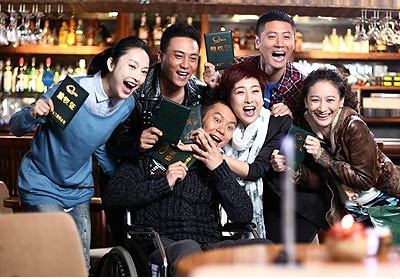
Director Zhao Baogang has a lot to say about youth – his "youth" trilogy about the lives of the post-1980 generation testifies to the fact.
關(guān)于"青春", 導(dǎo)演趙寶剛有很多話要講——他的講述80后生活的"青春三部曲"便是最好的證明。
In the 2007 TV series Struggle , the main characters fight to balance their successful careers with a romantic relationship. In My Youthfulness in 2009, a group of young people declare themselves their own masters and design their future.
在2007年播出的電視劇《奮斗》中,主人公們努力在事業(yè)與愛情上尋求平衡,而在2009年熱播的電視劇《我的青春誰做主》中,則是一群年輕人宣告自己做主,規(guī)劃未來。
The final installment, Beijing Youth, which just finished recently, is about revisiting youth and young dreams once again.
"青春三部曲"終極篇《北京青年》近日落下大幕,劇中講述了主人公們重走青春、重拾夢(mèng)想的故事。
Explored from different angles, the mental and emotional pain of growing up is the main theme throughout the three drama series.
"青春三部曲"從不同角度出發(fā),揭示出人們?cè)诔砷L過程中遭遇的精神和情感上的雙重痛苦這一主題。
In Beijing Youth, four cousins embark on a journey to rediscover their youth. They quit their jobs, leave their parents and Beijing, wander from place to place, earn a living from their passions, find love and realize their dreams.
在《北京青年》中,堂兄弟四人組踏上了重走青春的旅程。他們辭掉工作,離開父母和北京,游走于各地,憑著一腔熱情自食其力,尋找愛情,實(shí)現(xiàn)夢(mèng)想。
Zhao uses four characters to cover the entire post-1980 generation: He Dong, a civil servant on a stable salary; He Xi, a doctor, representing the growing bourgeois group; He Nan, an overseas returnee; and He Bei, who fools around without a job, but also wants to find his feet instead of depending on his rich dad.
趙寶剛以四個(gè)角色概述了整個(gè)80后:何東是位收入穩(wěn)定的公務(wù)員;何西則是名醫(yī)生,代表著逐漸壯大的中產(chǎn)階層;何南是位海歸;何北雖然整日游手好閑,卻也想自力更生,而不是靠著有錢的老爸過日子。
In Beijing Youth, the stories of these characters are collected along their traveling routes, told through their experiences in different cities, including Yantai, Shenzhen and Lijiang.
在《北京青年》中,四兄弟的故事都發(fā)生在旅途中。劇中講述了他們?cè)跓熍_(tái)、深圳和麗江等不同城市的經(jīng)歷。
During this drifting phase, they go through everything together. While their love stories are touching, what is more important is how they prove that their youth is exclusive and cannot be copied.
在這段漂泊的日子里,他們共同面對(duì)所有事情。除了感人的愛情故事,最重要的是他們?nèi)绾巫C明自己的青春是獨(dú)一無二、不可復(fù)制的。
As always in Zhao's work, the cast of Beijing Youth is filled with gorgeous young actors and there are many amusing and memorable lines.
正如趙寶剛以往的作品那樣,《北京青年》的演員陣容自然少不了俊男美女,同時(shí)還有很多令人難忘的搞笑臺(tái)詞。
Their road of rediscovery becomes a symphony of emotional collisions and conflicts. It's where the fun and entertaining part of the series really shines through.
他們重走青春的過程成了一部充滿感情糾葛和沖突的交響樂。這也正是該劇從頭到尾兼具搞笑和娛樂的所在。
"Youth is a very transient dream. When we wake up, it's gone, along with all the memories of it," Zhao said about the TV series in a press conference. "But throughout our lives, we always reflect on what youth has given us and what it has taught us."
"青春是一場(chǎng)倉促的夢(mèng)。當(dāng)我們醒來,它已經(jīng)離開,所有的回憶也隨之逝去。"趙寶剛在該劇的一場(chǎng)新聞發(fā)布會(huì)上表示。"但是我們這一生中,卻總是在回憶青春給了我們什么,教會(huì)了我們什么。"
"Everyone deserves a chance to regain their youth, especially young people. Because when you are young, you have nothing to lose."
"每個(gè)人值得重走青春,特別是年輕人。因?yàn)槟贻p沒有失敗。"


